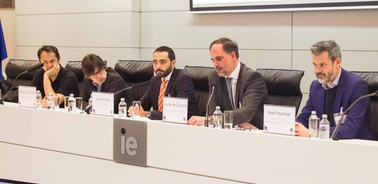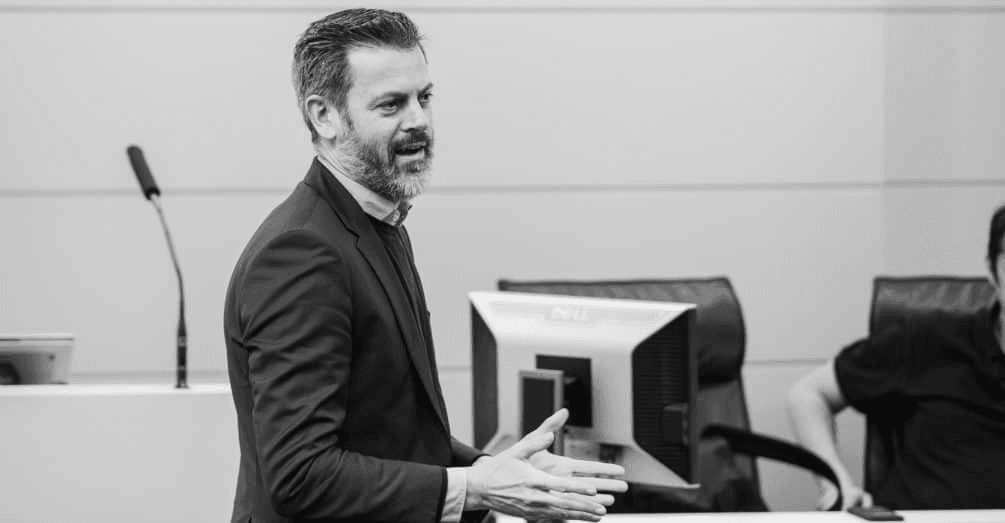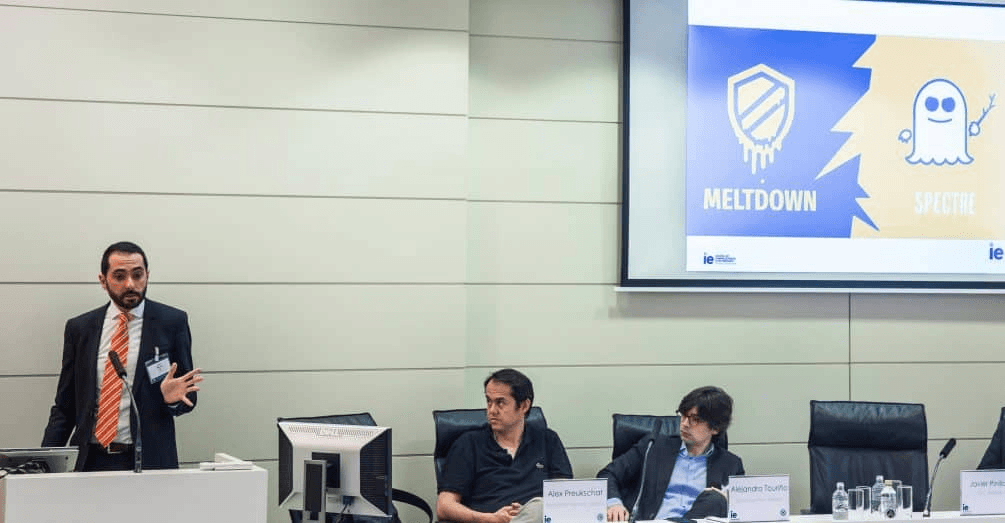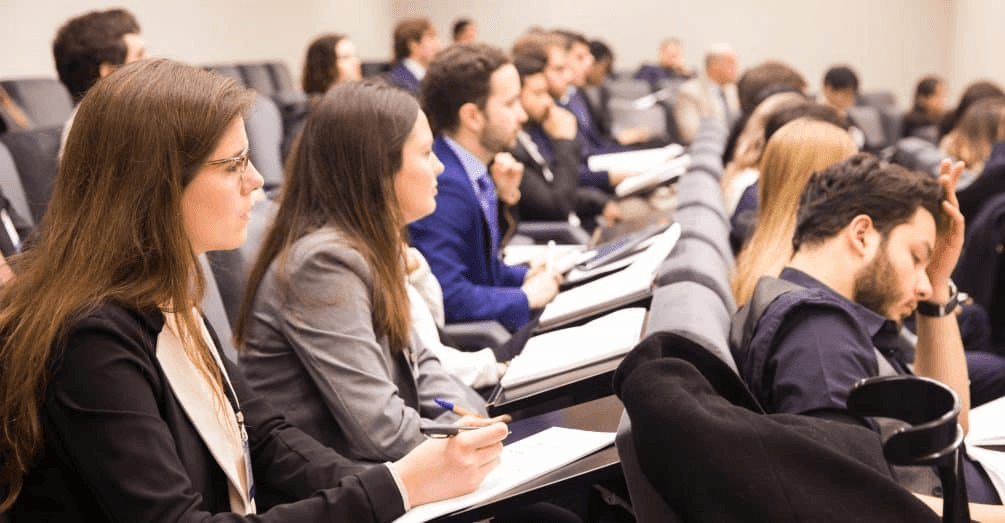- Home
- We Are Law School
- News
- Legaltech Trends That Are Reshaping The Industry (and How To Stay Up To Date)
Legaltech trends that are reshaping the industry (and how to stay up to date)

The Young Lawyers´ Training Course on “The Fundamentals of International Legal Business Practice: Challenges and Trends for the XXI Century Lawyer” took place at IE Law School last Thursday April 15. Find out what discussants had to say about the application of technology in the legal sector and their advice to young professionals.
The International Bar Association (IBA) Young Lawyers´ Committee has collaborated with IE Law School in order to discuss the challenges and changes the future lawyer might face. Javier de Cendra, Dean of IE Law School, led the discussion panel on Legaltech, where four speakers discussed topics relevant to 21st-century lawyers.
“Ubi societas ubi ius” - Law for Technology
Alejandro Touriño, ECIJA Law Firm
Law is intended to provide solutions to the problems that society is currently facing. This is a principle of Law discussed by Alejandro Touriño during the panel discussion on how Law will respond to the changes in technology. According to Touriño, the law is not meant to solve future issues, as these are hard to predict, but rather focus on current changes and situations that law needs to adapt to. Privacy, cybersecurity, intellectual property, physical integrity and tax avoidance are all risks faced with the evolution and changes in technology. Moreover, every country approaches legal solutions to the same issue in a variety of ways, as these are dependent on the culture and behaviors in that society.
The biggest challenge, according to Touriño is that laws are not adapted to the current situation. 21st-century technology is being faced with 19th-century laws.
His advice: it is necessary for lawyers to read, understand and interpret these laws to provide clever solutions, and….good luck!
“People that are changing the legal industry are not lawyers”- Legal Tech
Marti Manent, CEO, Derecho.com & elAbogado.com
Marti Manent discussed emerging tools, fields and methodologies, which are shaping the legal landscape, all driven by entrepreneurs or technology.
According to Manent, three emerging entrepreneurial practices shaping the legal landscape are:
- Finance firms investing in legal cases, such as Burford. These are not directed by lawyers, but by entrepreneurs in the financial sector.
- Methodologies such as the Lean Startup and Scrum. These are focused on having sprints in which teams focus on one task for a certain period of time, and then reviews them. These methodologies lead towards a more interactive form of work.
- Legaltech allows jurists to do what they are supposed to be doing, which is adding value to their work and the one that is actually required by the law.
Marti continued his presentation with a quick review of the three emerging technological tools shaping the legal landscape. These are:
- Legal analytics, which provides lawyers (and others) the ability to search through extensive information contained in cases and books to find what is relevant. Lawyers need the output of these systems, but it is not necessary for a lawyer to input the information into these systems.
- Bots and Scripts, which allows users to create codes that work inside a legal document and according to the preferences of each user. During the conference, Manent explained how to create scripts in Google Docs.
- Legal marketplaces. Marti Manent is an entrepreneur and founder of an online legal marketplace known as elAbogado, which offers clients the best opportunity to find legal solutions online and enables lawyers to be found online.
His advice: lawyers should learn and dig deep into the drivers of this change, about technology and entrepreneurial opportunities to become multifaceted professionals able to deal with and use the benefits technological changes bring.
"Lawyers should become multifaceted professionals able to deal with and use the benefits technological changes bring"
“Cyberspace is full of vulnerabilities” – Tech and Cybersecurity
Javier Pinillos, Information Security Manager, FCC, Madrid
Cyberspace is a universe full of vulnerabilities and hackers. The damage and frequency of cyber attacks are increasing at a global scale, they expand at a faster rate and lead to the appearance of new vulnerabilities, such as the Meltdown and the Spectre, not to mention all the legal consequences they entail. Compliance is being applied to cybersecurity, and IT teams in companies are facing increasing challenges to prevent security breaches.
His advice: Future lawyers should be able to deal with and understand technological terms in order to “translate” these cases into legal language. Demand for mixed skills is currently increasing and it is necessary for lawyers to understand both languages.
“Blockchain & Decentralization”
Alex Preukschat - Coordinator, Blockchain España
The way society is structured now has been inspired by characteristics such as efficiency and economies of scale, which foster centralized systems. Alex Preukschat, author of the book “Blockchain: la revolución industrial de Internet" (the industrial revolution of the internet)” is willing to experiment and learn from decentralization in order to change the status quo.
Blockchain is a system that creates trust in an environment where there is none. Using math, cryptography and community, Blockchain was able to create a transactions “database” which allows decentralization, which allows data to be shared globally at a very low cost and allowing assets to be exchanged in a censorship-resistant way, globally and instantly. Blockchain allows this to happen with some public blockchains (permissionless) such as bitcoin and some private ones (permissioned), used by companies to remove intermediaries.
His advice: talk to people in technology (the geeks), those that have a different perspective, and learn from them. They will be the ones creating and leading systemic changes in society, and through technology.


